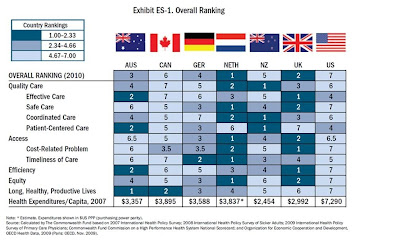
The NHS restructure itself is - unsurprisingly due to its haste - a confusing mix of decentralisation and privatisation... with the creation (ironically) of a raft of new quangos thrown in for good measure. Consequently,
no-one is quite sure what to make of it all, although many people could be forgiven for believing this is just part of a general privatisation of the public sphere.
In the light of this, it's worth pausing for a moment to consider the main calls from the Coalition for the very large changes being forced upon the NHS. These are familiar - that the NHS faced a large deficit, is unwieldy and is inefficient. The free market and private sector, by contrast, will be its saviour - lowering costs, offerering choice and improving standards. It is then worth looking abroad to the systems that the political right aspires to, to see just how much greener things are on the other side. The answer, predictably, is not very...
COSTS
An ageing population, demographic changes and increased demands from patients has left just about every health care system in financial trouble, whether it is the
crippling deficits that the very well-funded, social insurance-based French health system has been facing for years, or the huge costs of the private insurance-based US health system.
The latter system is particularly expensive, with health spending running at more than 15% of GDP [2008 figures], compared to around 8% in the UK, even after New Labour's dramatic funding increases. The expense is such that even though huge costs are absorbed by patients themselves (or their employers) in the form of private insurance and co-payments, the government - ironically - spends sums on subsidising the system matching those on a per-person basis that are spent in the public funding of the supposedly commie-socialist-fascist (delete abusive term as appropriate) UK system.
Meanwhile, the France continues to wrestle with a key problem of employer-funded social insurance systems- what happens when employers start to balk at the costs of paying for insurance for their workers?
ACCESS AND OUTCOMES
Despite its huge costs, the US system is manifestly unfair - something that all but the most blinkered Republican or Tea Party member would acknowledge. Prior to the Obama reforms of 2010, only 80% of people under 65 were covered by medical insurance and - crucially - even among those with insurance, many have insurance plans flimsy enough that they will fail to cover many medical costs, to the extent that 85% of those with insurance aren't covered for the costs of prescription medicines. As the latter are, unlike in the UK, unsubsidised and are not subject to regulatory controls on costs, these can be hugely expensive (this is for another post, though). The reforms themselves will do little to reduce these costs, as compromises have meant they are in essence a large subidy by government for the multi-billion private health industry.
As well as being unfair and expensive, US healthcare falls short in health outcomes when compared to other developed-world health systems. The independent Commonwealth Fund has consistently found the the US system has these deficiencies:
"
Despite having the most costly health system in the world, the United States consistently under performs on most dimensions of performance, relative to other countries... Compared with six other nations—Australia, Canada, Germany, the Netherlands, New Zealand, and the United Kingdom—the U.S. health care system ranks last or next-to-last on five dimensions of a high performance health system: quality, access, efficiency, equity, and healthy lives."
The report above (
the third edition of a comprehensive measurement of these systems going back more than half a decade), also contains a fact that will be news to most UK newspaper readers -
that the UK NHS is the most efficient of all these systems. The UK also ranks in the top two for the effectiveness of care, safety, equity and cost-based access [click on picture to open]:
Mind you, what's a comprehensively researched, quantitative and qualitative academic review of health care systems when you can have simple ideology, eh?















